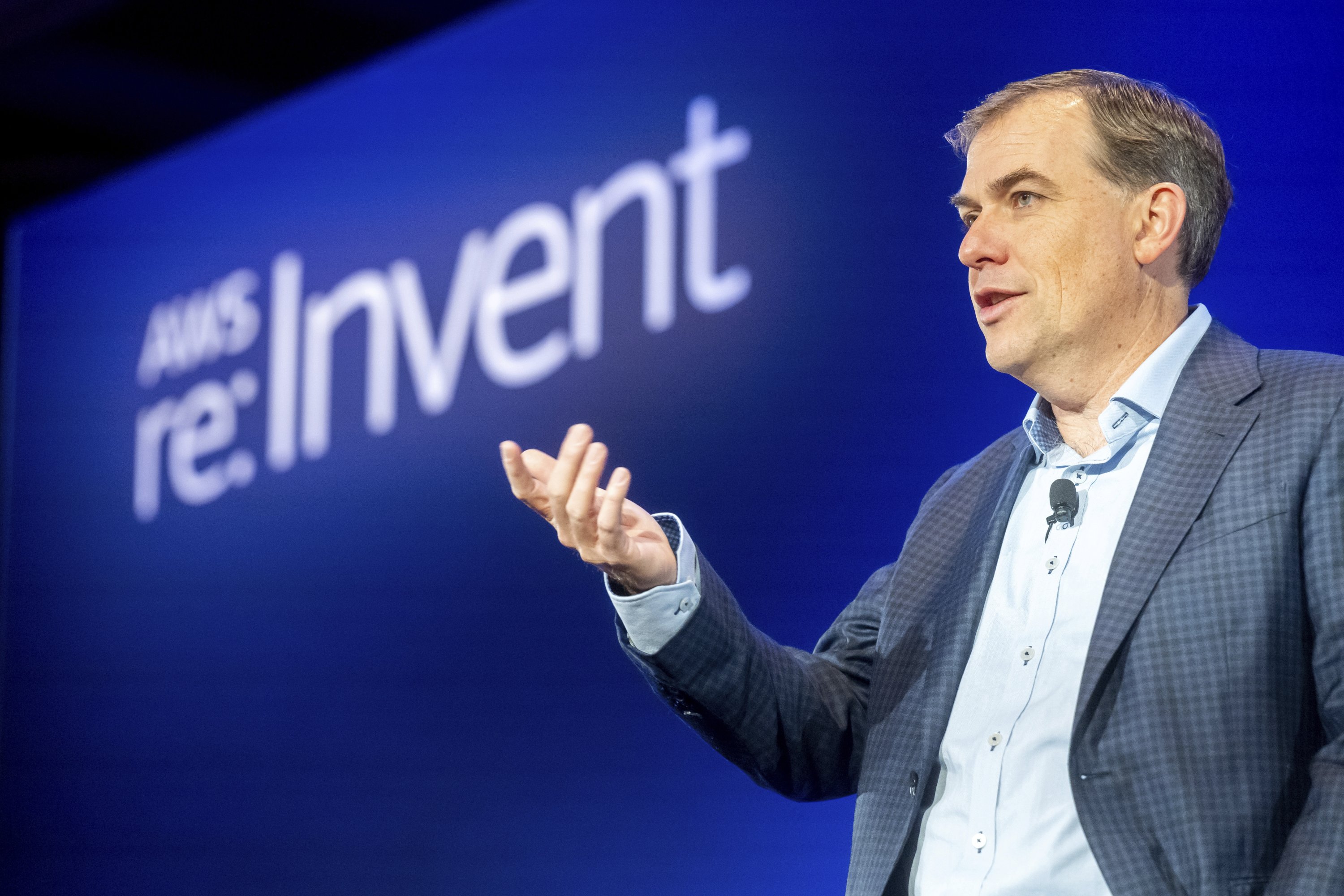© Turkuvaz Haberleşme ve Yayıncılık 2024
Amazon.com's cloud unit, Amazon Web Services (AWS), has announced a significant new initiative: $1 billion in cloud credits for startups developing generative AI solutions in 2025.
The announcement by AWS CEO Matt Garman at the annual re:Invent customer conference comes at a crucial time when access to financial resources is dwindling while cloud spending by entrepreneurs is increasing.
This week's event in Las Vegas, Nevada, was attended by 60,000 software developers and technology professionals, with 400,000 online viewers, and featured 3,500 speakers and 1,900 different sessions.
It has been a platform for the latest updates in the AWS ecosystem, especially around the ever-evolving field of generative AI.
Addressing the audience for the first time as chief executive, Garman said generative AI has the potential to radically transform all existing industries.
"Historically, startups have always been the ones driving such change. That's why it's a perfect time to think about how you, as a startup, can transform industries," he said.
"In fact, we support startups so much that I'm thrilled to announce AWS will provide $1 billion in cloud credits globally to startups in 2025. We're taking this step as we continue to invest in your success."
In a period when access to financial resources has become increasingly challenging, such an announcement represents a significant step for startups seeking to implement their solutions.
During the re:Invent event, Garman reminisced about AWS's early days in 2006, when their first customers were startups, as he emphasized the special place he says ventures hold for the company.
"What I love most about startups is their eagerness to try new technologies. They adapt quickly, provide us with great feedback, push us to innovate, and add their innovations on top of ours. They move incredibly fast, and we learn a lot from them. There has never been a more exciting time to be a startup, especially with generative AI," he noted.

AWS aims to leverage its cloud advantages to gain an edge over competitors, ensuring that the learning curve for AI happens on the AWS platform.
At the event, Amazon Web Services highlighted its next-generation solutions while stressing that AI alone is not a panacea. Businesses must stay focused on current issues in digital transformation without losing sight of their main objectives.
Garman's presentation did not ignore AI but emphasized the core services that have made AWS a $100 billion-a-year business, namely computing, storage, and databases.
Garman, who has been with AWS since its early days, reiterated the company's foundational role in providing the raw materials of the modern digital economy.
His presentation was divided into two parts, focusing, among others, on new developments in the core services that drive most of AWS's revenue.
Garman, who started his Amazon Web Services career managing the flagship EC2 compute service, introduced new compute instances running on NVIDIA's Blackwell chips and AWS's own Trainium2 chips, which are now generally available.
His keynote announcements centered around EC2 cloud computing and AI workloads using Tranium and Inferentia chips, emphasizing the industry's move away from NVIDIA dependency.
Benoit Dupin, Apple's senior director of machine learning and AI, made a noteworthy appearance, symbolizing a noteworthy endorsement of Amazon's AI race against cloud rivals like Microsoft and Google.
Dupin highlighted that Apple extensively uses Amazon services for products and services such as iPad, Apple Music, Apple TV, News, App Store and Siri. He emphasized AWS's critical role behind Apple Intelligence. Using AWS's Amazon Graviton and Inferentia chips for machine learning inference workloads, Apple has achieved more than 40% efficiency improvements compared to x86 instances.
He noted that Apple is currently evaluating AWS's newly announced AI training chip, Trainium2. Based on initial trials, Apple anticipates up to a 50% improvement in efficiency by pre-training its models on this chip.
Lori Beer, chief information officer (CIO) of JPMorgan Chase, was another prominent guest discussing digital transformation in the financial sector.
Beer outlined how JPMorgan Chase has extensively modernized its technology over the past four years, migrating hundreds of applications and rebuilding global banking and payment infrastructure using Amazon Web Services services such as Aurora, Graviton, and various compute and database solutions.
One of Türkiye's leading telecommunications and technology companies, Türk Telekom, is leveraging its cloud solutions to help revolutionize how organizations and businesses access digitalization capabilities.
The "Türk Telekom Cloud" platform offers a single point of access to a variety of services, including virtual data centers, storage, backup/business continuity solutions, and cybersecurity solutions.
The company is known for its solutions, seeking to provide end-to-end digital solutions for both public institutions and the private sector. With new-generation digital technologies focused on efficiency, such as data centers, cloud services, and cybersecurity, Türk Telekom Cloud delivers turnkey, value-added services to companies and public institutions in Türkiye, offering a global competitive advantage.
Recognizing national security as a critical element, Türk Telekom continues to support the local ecosystem in the field of cybersecurity. The company is consistently updating its products and services to counter increasing cyberattacks, offering corporate security services through Türkiye's largest cybersecurity center.
It is acting with the vision of "using local and national products in critical infrastructures" and continues investments and efforts to localize high-cost critical products and support the local ecosystem. The company is increasing the proportion of local products used in its cybersecurity services.
By developing domestic products and collaborating with local manufacturers, Türk Telekom ensures that Türkiye's data remains within the country and supports the growth of the local ecosystem.
Zeynep Özden, deputy general manager in charge of marketing and customer experience at Türk Telekom, says the company continues to spearhead the digital transformation of Türkiye with local and national technologies through Türk Telekom Cloud, offering global competitive advantages to public institutions and the private sector.
"Today, sustainable growth requires businesses to be more dynamic, flexible and innovative. Companies that use technology well and design their digitalization strategies correctly are the ones that succeed. Through 'Türk Telekom Cloud,' we support the innovation and digital transformation of institutions and provide flexible solutions to their capacity needs without relying on supply periods," said Özden.
"We help our customers gain a competitive advantage and increase their business value through efficiency. Our cloud solutions shape the technological infrastructure of organizations and businesses, accelerating their digital transformation and providing a competitive edge," she added.
"We will continue to offer the newest and safest technologies to our users in our country at the same time as the rest of the world."
Yurts, an artificial intelligence integration platform, has announced it had managed to secure a $40 million investment in a Series B funding round led by XYZ Venture Capital.
The round also saw participation from Glynn Capital, Nava Ventures, Bloomberg Beta and Mango Capital.
Founded in 2022 by Ben Van Roo, Jason Schnitzer, and Guruprasad Raghavan, Yurts provides generative AI solutions that help defense, government, and corporate clients transform critical workflows.
The company develops a platform that integrates AI models into high-security systems. Yurts plans to utilize the investment to accelerate its growth by integrating its generative AI technology into secure systems.
Yurts collaborates with the U.S. Department of Defense, emphasizing the importance of defense at the governmental level. By integrating AI models to meet high-security requirements, the company helps reduce the risk of data breaches.
Yurts aims to move AI solutions beyond experimental usage, integrating them into vital systems, thereby ensuring more effective and practical application of new technologies.
Togg, the manufacturer of Türkiye's first electric vehicle brand, aiming to create an open and user-centric mobility ecosystem, convened this week with the entrepreneurial ecosystem at the Türkiye Expo 2024 event.
The company used the event, organized by Plug and Play, to showcase its detailed agreements within the startup ecosystem, focusing on applications to enhance user experience.
The Türkiye Expo 2024 brought together local and global players from the innovation ecosystem. Togg participated with its fully electric C-segment SUV T10X and engaged with institutions and startups from various sectors.

Its Chief Executive Gürcan Karakaş shared the company's innovation journey with other participants.
Togg introduced the PDI Tunnel, an artificial intelligence-supported quality control, damage detection and digital expertise device developed in collaboration with technology company Wyseye.
The device can detect even the smallest damages within seconds. Vehicles passing through a specially equipped tunnel with cameras and lighting undergo instant inspections, automating checks that were previously done manually.
At the event, Togg also announced its partnership with Cerebrum Tech to develop AI-supported applications aimed at enhancing user experience.
These innovative applications will be available on the Tru.Store platform for T10X users, offering practical solutions that integrate the latest technology that simplifies daily life.
